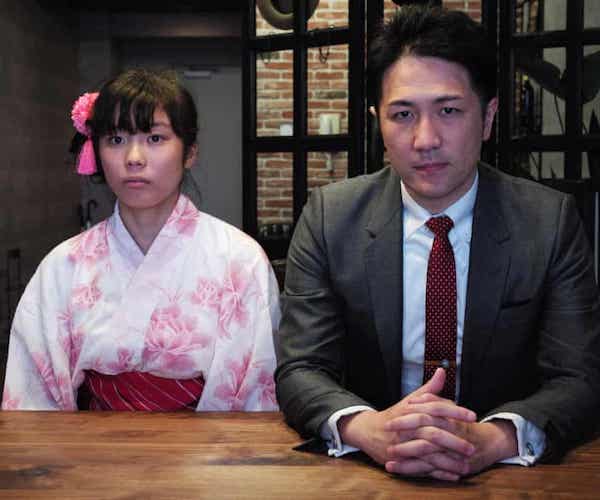Film Review: Werner Herzog’s “Family Romance” — Schmaltzy, Small, and Soft
By Gerald Peary
Family Romance, LLC is a wrong-headed, inferior Herzog movie. Wake up, Werner! Oh, for a jolt of Klaus Kinski.
Family Romance LLC, written and directed by Werner Herzog. Streaming on Amazon Prime.

Company boss Yuichi Ishii, right, with Mahiro Tanimoto, in Family Romance, LLC.
The Werner Herzog I’m familiar with is a mansplainer whose inflated speechifying is of a piece with his tramping around the world directing self-consciously mythic movies. But here’s a smiling, modest guy in his California study before neat shelves of books, a domesticated intellectual, offering a humble virtual introduction to his newest film, Family Romance, LLC. Has Herzog had a lobotomy? Or his body snatched?
Something drastic has happened to this German filmmaker in La La Land exile. I’ve taught a course on his works and seen several dozen of his films since the 1970s. I can say that there is nothing at all about Family Romance, LLC that reflects Herzog’s muscular vision of the world, his obsession with outlier males on heroic quests and, in tow, his total disinterest in everyday human relationships. This time? I kid you not: there are sentimental scenes of people hugging, of children playing with pets. There’s an almost romance between a man and a woman taken seriously. As for the tone, it couldn’t be further from Herzog’s operatic bravado. It’s schmaltzy, small, and soft.
The idea for this movie originated with a student in a virtual film production course Herzog had been teaching. Roc Morin returned from Japan wanting to make a film about a bizarre phenomenon he had encountered in Tokyo: a business which hired out its workers — living robots — to play simulated parts in clients’ daily lives, like a lost father or uncle. Herzog was so enthralled about what Morin reported that he took over the project for himself. Morin remained as producer and collaborator and translator of Japanese to English. And they went to Japan.
And made a deadly mistake. Herzog and Morin should have done a weird documentary about people playing roles on command in the lives of those who are employing them. Instead, Herzog decided to tell the story as Twilight Zone fiction. It turns out not involving at all—it’s alienating– knowing that the persons working for the company and the clients are all Herzog-hired actors.
Yuichi Ishii plays the lead character, also named Yuichi Ishii. He’s the president of Family Romance LLC, but it’s not a desk job. He frequently puts himself out to hire, though it’s hardly about the money for this utopian company. Ishii’s the nicest guy on earth, a veritable angel from a Capra movie dedicated to making those whom he works for completely happy. For example, he stands in for a man in deep trouble, a middle manager at the railroad who has made the trains run early. It is Ishii who is berated by the big boss and made to apologize on his knees so his client can breathe easy. When a father is too drunk to attend his daughter’s wedding, Ishii offers a pretend sober dad so the proceedings can go smoothly. A woman who has a psychological need to be awarded a prize is buoyed by faux cheerleaders at her door, ordered there by Ishii, announcing that she’s a winner.
Schmaltz.
The central story of Family Romance LLC is of Ishii pretending to be the lost father of Mohiro, a shy 12-year-old. The more they hang out, the more the repressed girl opens up, the closer they become. Meanwhile, Mohiro’s rich single mom becomes enamored of Ishii herself. Could everything work out?
Does this sound like the stale narrative of a TV movie? One more mistake: the actors, most with little film experience, were encouraged to improvise. Herzog was his own cinematographer and, though he doesn’t speak Japanese, he says he could intuit when the scenes were working and authentic. Well, his intuition failed because the made-up dialogue is often banal, and too many scenes are sleepy and dull.
Family Romance, LLC is a wrong-headed, inferior Herzog movie. Wake up, Werner! Oh, for a jolt of Klaus Kinski.
Link to a free screening
Gerald Peary is a Professor Emeritus at Suffolk University, Boston, curator of the Boston University Cinematheque, and the general editor of the “Conversations with Filmmakers” series from the University Press of Mississippi. A critic for the late Boston Phoenix, he is the author of nine books on cinema, writer-director of the documentaries For the Love of Movies: the Story of American Film Criticism and Archie’s Betty, and a featured actor in the 2013 independent narrative Computer Chess. His new feature documentary, The Rabbi Goes West, co-directed by Amy Geller, is playing at film festivals around the world.
